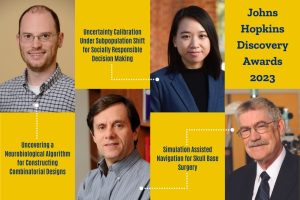
Four CS faculty members and their interdisciplinary research teams will receive 2023 Johns Hopkins Discovery Awards. Chosen from 191 proposals, Michael Dinitz, Peter Kazanzides, Anqi “Angie” Liu, and Russell Taylor are among 115 individuals on the 35 project teams that have been selected to receive support this year.
The Discovery Awards program was announced in early 2015, as was the Catalyst Awards program for early-career researchers. Together the two programs represent a $45 million university commitment by university leadership, along with the deans and directors of JHU’s divisions, to faculty-led research.
The Discovery Awards are intended to spark new interactions among investigators across the university rather than to support established projects. Teams can apply for up to $100,000 to explore a new area of collaborative work with special emphasis on preparing for an externally funded large-scale grant or cooperative agreement.
Dinitz’s work ranges from purely theoretical computer science to applications of theory, with a focus on computer networking and distributed systems as well as applications in artificial intelligence and machine learning. His more practical research includes data center topology design, resilient routing in overlay networks, fast optimization algorithms using machine-learned advice, and other optimization problems motivated by practice. He will work with Shreesh Mysore, an associate professor in Psychological and Brain Sciences at the Krieger School of Arts and Sciences, and Ernest Neibur, a professor of neuroscience at the Johns Hopkins University School of Medicine, on “Uncovering a Neurobiological Algorithm for Constructing Combinatorial Designs.” This project is co-funded with the One Neuro Initiative.
Kazanzides focuses on computer-integrated surgery and satellite servicing, real-time sensing to account for uncertainty, and systems engineering to enable deployment in the real world, while Taylor’s research interests include robotics, human-machine cooperative systems, medical imaging and modeling, and computer-integrated interventional systems. Together—along with Adnan Munawar, an assistant research scientist at the Laboratory for Computational Sensing and Robotics, and Francis Creighton and Deepa Galaiya, assistant professors in Otolaryngology – Head and Neck Surgery at the School of Medicine—they will research “Simulation Assisted Navigation for Skull Base Surgery.”
Liu’s research focuses on enabling machine learning algorithms to be robust to changing data and environments, to provide accurate and honest uncertainty estimates, and to consider human preferences and values in their interactions. She is particularly interested in high-stakes applications that concern the safety and societal impact of artificial intelligence. She will explore “Uncertainty Calibration Under Subpopulation Shift for Socially Responsible Decision Making,” joined by I-Jeng Wang, a research assistant professor in Computer Science and principal staff scientist at APL; Roy Adams, an assistant professor of psychiatry and behavioral sciences at the School of Medicine, and Lingzin Hao, the Benjamin H. Griswold III Professor in Public Policy at the Krieger School.